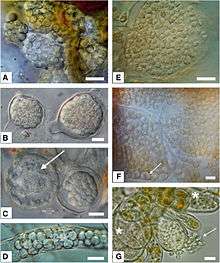Phytomyxea
The Phytomyxea are a class of parasites of plants. They are divided into the orders Plasmodiophorida (ICZN, or Plasmodiophoromycota, ICBN) and Phagomyxida.[1] A more common name for them is the plasmodiophorids, but this does not always include Phagomyxa (see taxobox).
| Phytomyxea | |
|---|---|
 | |
| Resting spores of different species | |
| Scientific classification | |
| Domain: | |
| (unranked): | |
| (unranked): | |
| Phylum: | |
| Subphylum: | |
| Class: | Phytomyxea Cavalier-Smith, 1993 |
| Orders | |
| Synonyms | |
| |
.png)
.jpg)
Life cycle
They typically develop within plant cells, causing the infected tissue to grow into a gall or scab. Important diseases caused by phytomyxeans include club root in cabbage and its relatives, and powdery scab in potatoes. These are caused by species of Plasmodiophora and Spongospora, respectively.[2]
The vegetative form is a multinucleate cell, called a plasmodium. This ultimately divides to form new spores, which are released when the host's cells burst. Both resting spores and motile zoospores, which generally have two smooth flagella, are produced at different stages. Within the plasmodium, dividing nuclei have a distinctive cross-like appearance.
Classification
Plasmodiophorids are traditionally considered slime moulds, because of the plasmodial stage. Thus they are often classified as fungi, and given names such as the Plasmodiophoromycota. However, genetic and ultrastructural studies indicate they belong to a diverse group of protists called the Cercozoa, or are closely related to them.
- Class Phytomyxea Engler & Prantl 1897 em. Cavalier-Smith 1993
- Genus ?Pongomyxa
- Order Phagomyxida Cavalier-Smith 1993
- Family Phagomyxidae Cavalier-Smith 1993
- Genus Phagomyxa Karling 1944
- Family Phagomyxidae Cavalier-Smith 1993
- Order Plasmodiophorida Cook 1928 em. Cavalier-Smith 1993
- Family Endemosarcidae Olive & Erdos 1971
- Genus Endemosarca Olive & Erdos 1971
- Family Plasmodiophoridae Berl 1888 (plasmodial slime moulds)
- Genus Cystospora Elliott 1916 nomen dubium [Acrocystis Ellis & Halsted ex Halsted 1890 non Zanardini 1872]
- Genus Maullinia Maier et al. 2000
- Genus Phytomyxa Schröter 1886
- Genus Ligniera Maire & Tison 1911 [Anisomyxa Němec 1913; Rhizomyxa Borzí 1884; Sorolpidium Němec 1911]
- Genus Membranosporus Ostenfeld & Petersen 1930
- Genus Octomyxa Couch, Leitner & Whiffen 1939
- Genus Plasmodiophora Woronin 1877 [Frankiella Maire & Tison 1909 non Speschnew 1900; Frankia Brunchorst 1886 non; Ostenfeldiella Ferdinandsen & Winge 1914]
- Genus Polymyxa Ledingham 1933
- Genus Sorodiscus Lagerheim & Winge 1913 non Allman 1847
- Genus Sorosphaera Schröter 1886
- Genus Sorosphaerula Neuh. & Kirchm. 2011
- Genus Spongospora Brunchorst 1887 [Clathrosorus Ferdinandsen & Winge 1920]
- Genus Sporomyxa Léger 1908
- Genus Tetramyxa Goebel 1884 [Molliardia Maire & Tison 1911]
- Genus Woronina Cornu 1872
- Family Endemosarcidae Olive & Erdos 1971
References
| Wikispecies has information related to Phytomyxea |
- David Bass; Ema E.-Y. Chao; Sergey Nikolaev; Akinori Yabuki; Ken-ichiro Ishida; Cédric Berney; Ursula Pakzad; Claudia Wylezich; Thomas Cavalier-Smith (February 2009). "Phylogeny of novel naked filose and reticulose Cercozoa: Granofilosea cl. n. and Proteomyxidea revised". Protist. 160 (1): 75–109. doi:10.1016/j.protis.2008.07.002. PMID 18952499.
- Agrios, George N. (2005). Plant Pathology. 5th ed. Academic Press. link.